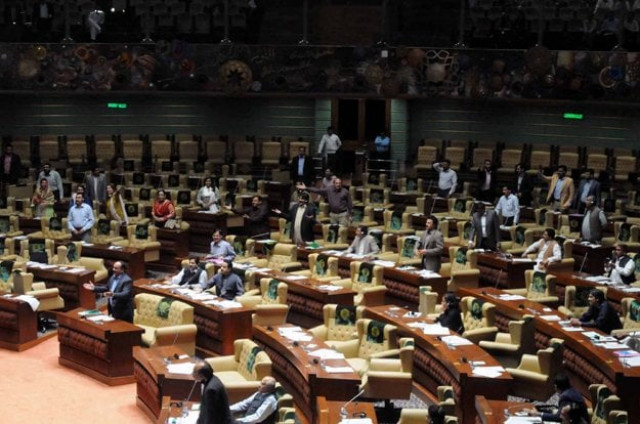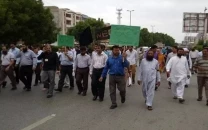Sindh Assembly rejects TTP talks
Says the supremacy of parliament must be considered before such a decision

Amid protests from the opposition, the Sindh Assembly passed a resolution on Friday, expressing concern over the ongoing negotiations with the Tehreek-e-Taliban Pakistan (TTP). The house demanded that the federal government take all relevant stakeholders on board before making such a decision.
The resolution also urged involving political parties and other institutions through parliament and to build a unanimous consensus over such a consequential move. Since the Taliban's takeover of Afghanistan, the TTP has ramped up attacks on its side of the border, compelling Islamabad to reach a peace deal.
However, experts say the group has been emboldened by the United States withdrawal from Afghanistan. The resolution, moved by Pakistan Peoples Party (PPP) MPA Qasim Siraj Soomro, was opposed by Pakistan Tehreek-e-Insaf (PTI) and Muttahida Qaumi Movement-Pakistan (MQM-P) lawmakers.
"This house objects to the unilateral negotiations with banned TTP that are being carried out in the most secretive manner by the federal government which indicates the complete bypass of parliament as the supreme institution in the country to decide upon such matters of national security," the resolution stated.
It further added that the "TTP has claimed thousands of innocent lives in the country over the last two decades, including of innocent civilians, brave soldiers of the armed forces, police officers, religious scholars, non-political prominent people and lest we forget, the Army Public School (APS), Peshawar massacre. To initiate talks with such a ruthless organization indicates the federal government's unwillingness to crush them by means of force," it read.
"[The] prime minister cannot strike a deal with TTP on its own as this matter of our national interest and must be discussed in the parliament. The house demands the Federal Government to take on board all relevant stakeholders, political parties and institutions through the Parliament and build unanimous consensus over such a consequential move," the resolution concluded.
As Soomro moved the resolution, Sindh Assembly Opposition Leader Haleem Adil Shaikh stood up from his seat and opposed it. He wanted to speak on the subject, but deputy speaker Rehana Leghari did not allow him the opportunity."Let the mover say something on it. I cannot allow you to interrupt the session," she said.
But Shaikh continued his protest along with party members from his party and MQM MPAs. The Deputy speaker, setting aside their objection, gave the floor to the mover to continue his speech on the resolution.
Soomro talked about the supremacy of parliament and questioned why negotiations with banned militant organization had been initiated without consulting different stakeholders. He continued that the matter should have been raised in the National Assembly and Senate.
"The people of Pakistan repose trust in elected members and parliament, a legislative body. Talks with TTP show that federal government is imposing its unpopular decisions," he said. Soomro stated that governments negotiate with terrorist outfits organizations in the best interest of their people, but a proper procedure is adopted.
"I, again, request the federal government not to make decisions in haste and take all stakeholders into confidence on this sensitive issue," he concluded.
Read More: Sindh Assembly struggles to pass legislations
As Soomro finished his speech, the deputy speaker put the resolution to the vote and it was adopted with majority votes.
Earlier, Arif Mustafa Jatoi of the Grand Democratic Alliace (GDA) drew the house's attention towards the Sindh government's policy to reduce passing marks in the IBA test conducted for teachers. Moving a call to attention notice, he put questions to the Sindh Education Department and pointed out that during the recent IBA-conducted tests, the fall ratio was over 99 per cent and government was reducing passing marks.
"This will destroy the already pathetic education system persist in the province as compare to Punjab where teachers are only appointed if fully qualified." Jatoi said that the reduction of passing percent from 55 to 40 percent will pave the way for those candidates who can't teach at schools.
"Now, we have heard that candidates in less privileged areas, women and minorities are given more relaxation in the passing ratio. This will further dent meritocracy and the quality of education," he remarked.
Minister for education, Sardar Shah responded to Jatoi's call to attention and endorsed the suggestion that merit must be upheld.
"Not a single case can be proved where merit has been comprised in the entire process. A son of education secretary has not qualified. You can imagine the situation. IBA has conducted the test in a professional manner," he said.
The minister added that every year, around 6,000 teachers retire every year and the last time the appointment process was carried out was in 2018.
"If jobs are not given to the educated youth, then they will be indulge in illegal activities," he said. Shah continued that the average passing marks were 55 per cent that has now been reduced to 50. "Yes, we have further reduced the passing percent for minorities and for people from far flung areas in the best interest of candidates," the minister said.
Published in The Express Tribune, November 20th, 2021.



















COMMENTS
Comments are moderated and generally will be posted if they are on-topic and not abusive.
For more information, please see our Comments FAQ